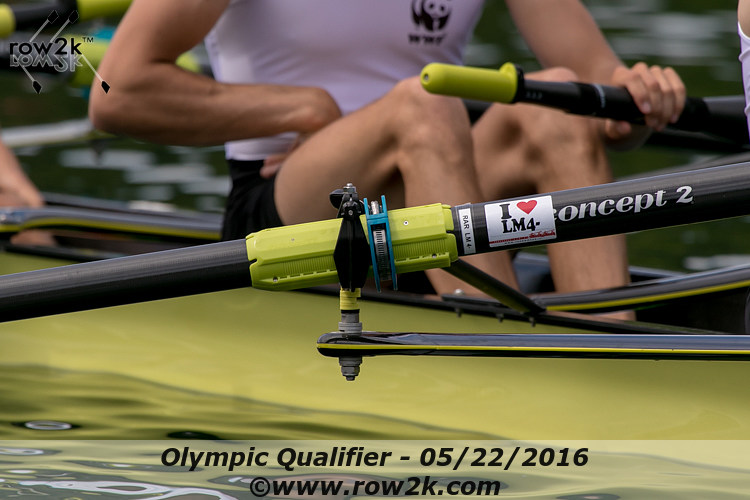FISA Announces Final Options for 2020 Olympic Rowing Program
Ed Hewitt, row2k.com

After a long and complex debate regarding how best to adjust the Olympic rowing program to accommodate gender equality requirements, FISA announced today that the myriad potential solutions to the issue previously under consideration have been distilled down to two options, one of which will be chosen by an absolute majority vote by national governing bodies at the FISA Extraordinary Congress in February.
The two options:
- recommended by the FISA Council: Replace the LM4- with the W4-
- recommended by AUS, CAN, CHN, DEN, SUI: Replace the M4- with the LW4-
These final two proposals reflect a considerable contraction of the options under consideration when row2k last visited this issue back in March which were:
- Proposal 1: Add W4- (13 entries) remove LM4-, reduce LM2x to 18 entries (from 20), expand W4x to 10 entries (from 7), reduce LW2x to 18 entries (also from 20)
- Proposal 2: Add LM1x and LW1x (34 entries each), remove LM4- and M4-, expand W1x and M1x to 34 entries each (from 32), expand M4x and W4x to 13 entries (from 7)
- Proposal 3: Add W4- (7 entries), LM1x and LW1x (34 entries each), remove LM4-, M2x and W2x, expand M4x and W4x to 13 entries (from 7)
Although the balance of the two final proposals would suggest a third option, that of trading the men's four for the women's four and leaving the light men's four alone, as written the two proposals set up a more stark debate that comes down to the historically cherished men's four vs. the whole of lightweight sweep rowing.
Factors driving the debate are manifold (many of which we also outlined in the March article):
- The IOC's gender equality mandate, which requires that all Olympic sports offer an equal number of spots for male and female athletes; rowing currently stands at 60% male/40% female
- The IOC's declared authority and clear willingness to dictate event allocation to governing bodies that fail to present satisfactory plans
- To a lesser extent than gender equality but certainly influential, the IOC's gathering resistance to including weight-based events in the Olympic program (the IOC was reviewing the elimination of lightweight events in rowing as early as 2002)
These colliding factors have created a turbulent point of confluence for the sport of rowing to navigate.
A Bit of History, and Arguments For and Against
The addition of lightweight events for the 1996 Olympics was driven in large part by the desire to expand participation and medal opportunities alike to a wider number of countries to create an environment of "universality;" in the simplest terms, the idea was that lightweight events would be accessible to smaller and less developed countries with smaller athlete pools from which to draw (or in even more prosaic terms, the idea was that far more countries could field competitive crews if they did not need to find four 6'4" 205-pounders just to consider the event).
Probably most damningly, the lightweight four has been dominated by European and other traditional rowing countries such that the podium is often occupied by the same countries that are winning medals in the open events; with the notable exception of the South African gold medal in London, there have been few winners and medalists beyond the traditional rowing countries.
(That said, the presence of the Swiss four at the front of the field could make the case for universality, as certainly you don't see Switzerland in the medals of the open men's four.)

A case has been made that simply removing the open men's four would retain these opportunities for lightweights and a continued striving for universality; however, the tremendous competitiveness of the event has confoundedly undermined this argument to some extent.
With the top light men's fours approaching (and often surpassing – the world record for coxless men's fours was held by the Danish lightweights for several years) the speed of the open men's four event, the case that lightweights could not simply enter and succeed in open weight events was less compelling. In this case, success has hurt the event.
Add to that the fact that many of rowing's most celebrated athletes and achievements have come from the men's four (Redgrave's fifth and Pinsent's fourth gold medals come to mind, as does the Aussie Oarsome Foursome, and others), and there is tremendous reluctance and resistance even to contemplate the loss of the men's four from the Olympic program.
(Edit 5pm: then again, the Danish four is pretty legendary in their own right.)
Another factor favoring the women's four: the addition of this event will give across-the-column parity between men's and women's events; that is, there will be a men's and women's 1x, 2x, 4x, 2-, 4-, and 8+, and then a men's and women's light 2x.
On the side of the men's lightweight four, a couple compelling factors remain:
- Light men's rowing does have some robust participation worldwide, including at the collegiate level, and
- Perhaps most of all, the event consistently offers the best damn six-boat racing at every Olympic, World Championship, and World Cup regatta. What sport wants to see its most intensely contested and arguably most exciting event go away? Even at the World Championships, when the light men's four racing starts, it's like the whole boatyard is full of people with hairs standing on end.
Given its slightly different demographics, the addition of a lightweight women's four might well defy the trend, it is hard to say (especially since the event has not been even on the World Championships docket for over a decade, so likely subscription patterns are hard to predict); although most observers would agree that accommodating even smaller boats – the light women's single in particular – would likely be a more successful route to the goal of universality in the overall program. Certainly the open singles include a more diverse array of countries at the top of the field; in Rio, scullers from Cuba, Mexico, and Egypt were in the top 10 in the men's single, and scullers from Zimbabwe and Mexico in the top 12 in the women's single.
The FISA Extraordinary Congress meets in February; row2k will continue to track the story as it develops.
Further reading:
- FISA: Rowing's Member National Federation Leader Discuss Future Of The Sport
- FISA's Hard Look at Rowing's Future
If you enjoy and rely on row2k, we need your help to be able to keep doing all this. Though row2k sometimes looks like a big, outside-funded operation, it mainly runs on enthusiasm and grit. Help us keep it coming, thank you! Learn more.
Comments | Log in to comment |
- Bont Rowing
- Calm Waters Rowing
- Concept 2
- Craftsbury Sculling
- The Crew Classic
- CrewLAB
- Croker
- Dad Vail Regatta
- Durham Boat Co.
- Empacher
- Faster Masters
- Filippi
- Fluidesign
- h2row.net
- HUDSON
- Live2Row Studios
- Nielsen-Kellerman
- Oak Ridge RA
- Peinert Boat Works
- Pocock Racing Shells
- Race1 USA
- Rockland Rowing Masters Regatta
- RowKraft
- Rubini Jewelers
- Vespoli USA
- WinTech Racing
- Bont Rowing
- Calm Waters Rowing
- Concept 2
- Craftsbury Sculling
- The Crew Classic
- CrewLAB
- Croker
- Dad Vail Regatta
- Durham Boat Co.
- Empacher
- Faster Masters
- Filippi
- Fluidesign
- h2row.net
- HUDSON
- Live2Row Studios
- Nielsen-Kellerman
- Oak Ridge RA
- Peinert Boat Works
- Pocock Racing Shells
- Race1 USA
- Rockland Rowing Masters Regatta
- RowKraft
- Rubini Jewelers
- Vespoli USA
- WinTech Racing


















01/02/2017 11:24:41 AM
12/19/2016 11:12:30 AM
12/15/2016 1:40:19 PM